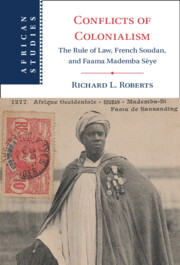Book contents
- Conflicts of Colonialism
- African Studies Series
- Conflicts of Colonialism
- Copyright page
- Contents
- Figures
- Maps
- Tables
- Preface
- Acknowledgments
- Abbreviations
- Introduction
- 1 Mademba and the Foundations of the Bargains of Collaboration, 1852–1888
- 2 Conquest and Construction of Indirect Rule in the French Soudan, 1886–1891
- 3 “A World of Deception and Defection”
- 4 “A Curious and Very Engaging Mixture of European and Native Customs”
- 5 The Coming Storm, 1898–1899
- 6 Rule of Law and the Bargains of Collaboration
- 7 “An Unexpected and Precious Collaborator”
- 8 Remaking Mademba, 1906–1931
- Conclusion
- Bibliography
- Index
- African Studies Series
7 - “An Unexpected and Precious Collaborator”
Mademba’s Redemption, 1900–1906
Published online by Cambridge University Press: 17 February 2022
- Conflicts of Colonialism
- African Studies Series
- Conflicts of Colonialism
- Copyright page
- Contents
- Figures
- Maps
- Tables
- Preface
- Acknowledgments
- Abbreviations
- Introduction
- 1 Mademba and the Foundations of the Bargains of Collaboration, 1852–1888
- 2 Conquest and Construction of Indirect Rule in the French Soudan, 1886–1891
- 3 “A World of Deception and Defection”
- 4 “A Curious and Very Engaging Mixture of European and Native Customs”
- 5 The Coming Storm, 1898–1899
- 6 Rule of Law and the Bargains of Collaboration
- 7 “An Unexpected and Precious Collaborator”
- 8 Remaking Mademba, 1906–1931
- Conclusion
- Bibliography
- Index
- African Studies Series
Summary
As Mademba returned to his kingdom following his nearly eleven months under house arrest in Kayes and Médine, he confronted new challenges to his authority and his rule. As part of his acquittal of changes of abusing power, the governor-general appointed a European clerk to monitor his rule. Mademba was always correct with the European Residents in Sinsani, but he managed to maneuver them into a relatively vacuous position. Mademba set about remaking himself yet again, this time as a champion of cotton to feed the metropolitan textile industry. Mademba’s cotton was well regarded by French cotton brokers and spinners and boosted the efforts by the newly formed Association Cotonnière Coloniale to promote a bright economic future for the Soudan. Mademba also faced new challenges, including growing resistance by his prisoners of war to continue to work for him, which coincided with the end of slavery in the French Soudan, and by legal reform that required increased transparency in the adjudication of disputes and application of punishments.
Keywords
- Type
- Chapter
- Information
- Conflicts of ColonialismThe Rule of Law, French Soudan, and Faama Mademba Sèye, pp. 230 - 268Publisher: Cambridge University PressPrint publication year: 2022

